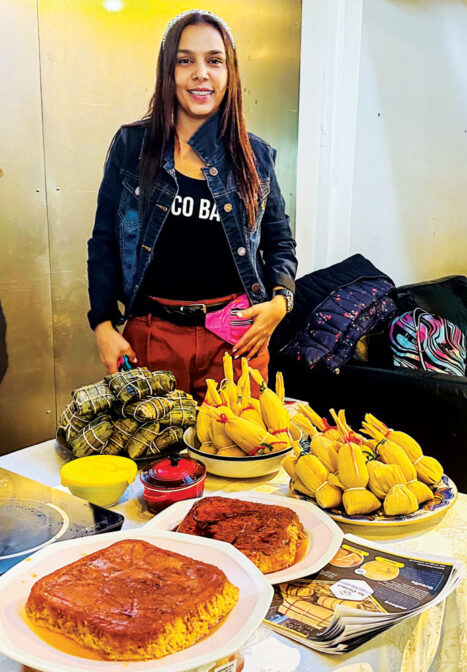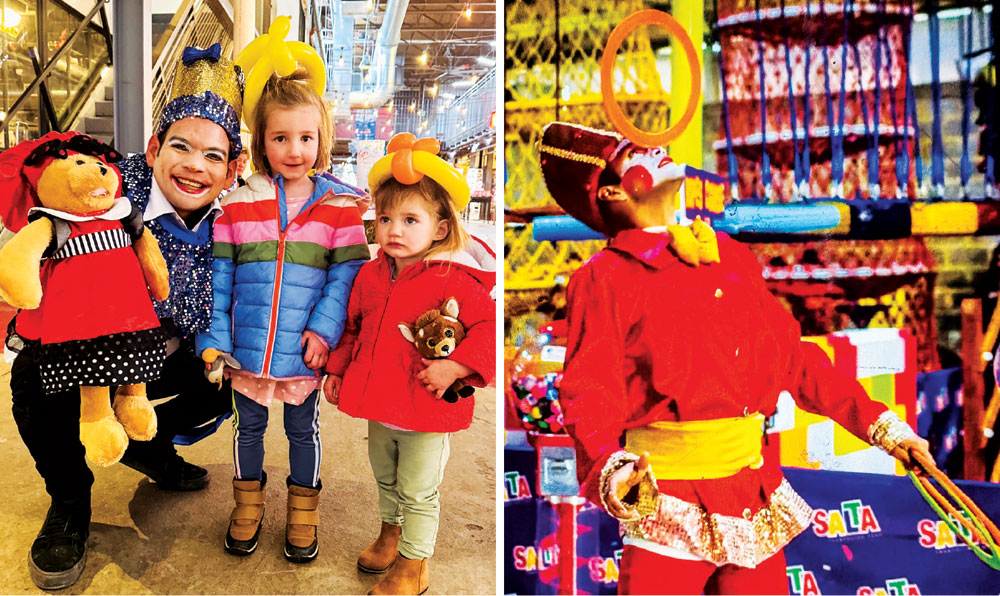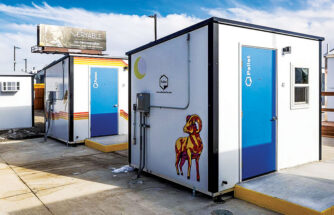
Janecy, who worked as a waitress in Venezuela, styles Elin Myers’ hair in Stanley Marketplace’s retail space for migrant entrepreneurs. Front Porch photo by Christie Gosch
Seeking Solutions for Venezuelan Newcomers
The massive influx of migrants from Venezuela and other Latin American countries continues to strain city services. Denver’s Deputy Chief of Staff, Evan Dreyer, says the City is currently housing approximately 4,500–5,000 migrants at any given time, and anticipates that the final bill in 2023 for sheltering migrants and providing services will land at about $45 million. Denver is still waiting on the federal funds of $9 million that were awarded in 2023. Mayor Mike Johnston was in Washington, D.C. in January for the U.S. Conference of Mayors, where he planned to “shake that tree” as well as advocate for a coordinated solution to Denver’s migrant crisis.
“Our funding scenario has forced us to pause,” says Dreyer, when asked about a housing subcontract that Dreyer had expected the City would announce in January. “We have to reevaluate what we can afford.” At the current level, he says the tab for 2024 could be $180 million, or about 10 percent of the Denver budget. That far exceeds the amount planned for in the 2024 budget that the City Council unanimously approved in November 2023.
As Denver and other cities await a response from the federal government about better coordinating efforts across the nation and expediting work authorizations for the migrants, Dreyer says Denver is “trying to do this in a balanced manner where we bring the number of folks in shelters down in a way that does not lead to migrants being on the street.”
To that end, the City continues to work with the State and non-profits to conduct clinics to get housing applications completed. People displaced from the Zuni encampment, which was razed in January, recently attended a weekend clinic where the City offered support in the form of the first month’s rent and a security deposit.

Andrea, a Venezuelan migrant, shows off traditional Venezuelan cuisine, including hallaca (tamale) in banana leaves and quesillo (flan). Front Porch photo by Christie Gosch
The question remains, however, as to how Denver can sustain these supports as the buses continue to arrive. Dryer affirms that the City’s top three issues in conversation with the Biden administration continue to be “the need for national coordination of resettlement, transportation, and funding.”
Migrant Marketplace
As the City continues to look for money and solutions, individuals and businesses continue to step up with new ideas. One of the latest has been taking place at Stanley Marketplace.
In January, Stanley opened a vacant retail space on Tuesdays for some of Colorado’s Venezuelan newcomers to sell their wares or teach their skills. During a Denver Public School snow day, salsa and bachata music filled the second-floor space while a Venezuelan woman led children in a dance class. Vendors sold everything from dog leashes made of discarded climbing ropes to hallaca, a traditional meat dish wrapped in banana leaves.
Downstairs, “Yupi the Clown” juggled and made balloon animals while wearing a bedazzled costume he created out of clothing foraged from donations. With a university degree in tourism, Jesús (Yupi’s real name) hopes to make a life in Denver that puts his education to work, but right now his circus school education from Caracas is proving more valuable.
Volunteer Janesa Lockhart says the initiative began with some local members of a Facebook group (see January’s Front Porch story) who thought a pop-up shop would allow migrants to earn some income as they navigate the challenges of life in Denver. Though initially conceived as an outdoor venture, when the temperatures dropped, Stanley Marketplace stepped up. Behind each entrepreneur, Lockhart says, are a host of volunteers who helped provide a ride to get supplies, a space to cook, or a variety of other resources.

Left photo: Yupi the Clown entertains children at Stanley, making balloon hats for Lennon (left) and Maren (right) Froseth. Right photo: Yupi learned circus tricks at clown school in Caracas. Here, he performs in Venezuela.
“Finding Their Way—A Migrant Fundraising Series” will continue as long as the vacant retail space isn’t rented. Many residents and migrants hope there can be additional entrepreneurial opportunities. The need will continue, certainly, as Denver’s flow of newcomers shows no sign of slowing.
House1000 Meets Goal But Much Work Remains

A micro-community with 50 pallet shelters opened on Peoria St. as part of the House1000 plan.
Mayor Mike Johnston met his campaign promise to get 1,000 people who were living on the streets into temporary housing by the end of 2023. According to city officials, the House1000 initiative closed ten encampments and placed 1,034 individuals in converted hotels, tiny home micro-communities, or permanent units. More than half of those people were sheltered in Northeast Denver, including in a tiny home village of 50 pallet shelters that opened in late December at 38th Ave. and Peoria St. Some Northeast Denver residents have raised concerns at town hall meetings that District 8 was bearing too much of the burden of providing temporary shelter.
Johnston has pledged that eventually every city council district will have some form of non-congregant temporary housing shelters to meet the burgeoning demand. His goal is to get at least 1,000 additional people off the streets in 2024. Two more tiny home villages are expected to open by the end of February in the Golden Triangle neighborhood and on South Santa Fe Dr.
The Colorado Coalition for the Homeless (CCH) has been helping city officials with the encampment cleanups and in February will begin providing medical services to residents in the micro-communities and converted hotels. Johnston has said that wrap-around services such as medical care, job training, addiction counseling, and mental health services are key to helping people stay off the streets.
Cathy Alderman, public policy officer with CCH, applauds what has been accomplished so far—but says now the real work begins. “I’m proud that the goal was met, but that being said, the next step is really critical: making sure these folks have the opportunity to move into long-term housing.”
The mayor has talked about adding 3,000 permanently affordable housing units in the coming year, but it’s unclear where he would get the units. Later this summer, CCH will open 216 units of housing by converting a hotel into studio apartments near I-25 and I-70. “Doing these conversions really brings housing to market much sooner than building from the ground up, so we need to think about whether there are other opportunities to do additional conversions like that,” says Alderman.



Why are media referring to them as migrants? They are illegal immigrants.
From our writers: Thank you for sharing your response to this piece. Though we cannot speak for other media, the Front Porch opts to use the word ‘migrants’ since many of these individuals qualify for Temporary Protected Status, which includes both work authorization and protection from deportation. Most are refugees, and are awaiting court dates that will determine their legal status in the U.S. Until such determinations, referring to them as ‘illegal’ would therefore be inaccurate.
Awesome story author – thanks for editing unlike others that grab a story and put add ons – again thanks for keeping it real 🥳!!!